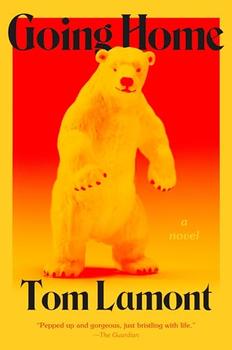
A Novel
by Tom Lamont
Going Home is a sparkling, funny, bighearted story of family and what happens when three men—all of whom are completely ill-suited for fatherhood—take charge of a toddler following an unexpected loss.
Téo Erskine, now in his thirties, has moved on from childish things: He has a good job, a slick apartment in London, and when he heads back to the suburbs on the occasional weekend to visit his old friends, he makes sure everyone knows he can afford to pick up the tab. So what if he asks a few too many questions about Lia, the girl of their group, wondering if she will come out, if she's seeing anyone, if she might give him another shot? Téo is hazily aware that something possibly happened between Lia and Ben Mossam, Téo's closest friend and his greatest annoyance, but he can't bring himself to ask. Lia, meanwhile, has no time to indulge their rivalry. She's now the single mother of a toddler son, a kid named Joel that Téo occasionally (and halfheartedly) offers to babysit.
Téo is home for one such weekend when the unthinkable happens—a tragedy in the heart of their group—and he suddenly finds himself the unlikely guardian for little Joel. Together with his father, Vic, Ben Mossam, and Sybil, Lia's beguiling rabbi, they bide time until they can find a proper home for Joel, teaching him to play video games, plying him with chicken nuggets and waffles, and learning to sing him lullabies at night. But when a juvenile mistake leads to a terrible betrayal, Téo must decide what kind of man he wants to be. Wise, relatable, and blissfully laugh-out-loud funny, Going Home is a captivating first novel that explores the mysterious ways children can force us to grow up fast while simultaneously keeping us young forever.
"There is so much to love about this book, foremost the poignantly, sometimes painfully detailed portrait of 30-something guys...A great premise, a great story, but most of all, great characters." —Kirkus Reviews (starred review)
"Though the story takes a while to gel, Lamont offers a textured view of Téo's family and Jewish community, and he keeps the reader invested as the characters adjust to Lia's death and attempt to figure out Joel's future. Readers will be hooked." —Publishers Weekly
"It's rare to read something that captures with such unsentimentality a child's range, their rapidly shifting obsessions, the quiddities of their language, their cunning wiles...Children seem to be more alive than adults, keener, less jaded, and this novel feels the same, pepped up and gorgeous, just bristling with life." —The Guardian
"A meltingly warm comedy." —The Observer, "Top 10 best debut novelists of 2024"
"Well-drawn characters, believable dialogue and nuanced emotions cast new light on love in this bittersweet book." —Sunday Express
"Good prose comes easily to Lamont; it can feel impressive and judicious without bring precious....Lamont continues to prove himself to be a champion and poetic transcriber of the local....Going Home has the lot. It has been a while since I've read a piece of straightforward British realism and been this impressed." —Financial Times
"In capturing the gradual and thorny journey of Joel and Téo towards becoming father and son, almost despite themselves, Lamont does something remarkable....Lamont shows that parenthood is made in the parenting, not in any blood connection. And in this honest depiction, it consists of frustration, impatience, poor sleep and rapturous moments of comedy, love and tenderness." —Literary Review
"Going Home is a poignant yet funny novel about three men taking turns at shouldering responsibility and shrugging it off, at worrying and causing worry, at giving care and needing it. Tom Lamont writes in clear, swift prose about the power struggles that exist in even the most living of families and the longest of friendships. A lyrical, hypnotic delight." —Katherine Heiny, author of Games and Rituals
"A debut which skilfully and tenderly explores male relationships, belonging and what we leave behind. I adored every moment. The characters have stayed with me ever since." —Bella Mackie, author of How to Kill Your Family
"Bittersweet, funny and moving, Going Home is all this but also has a bright ring of truth which chimes on every page." —Claire Fuller, author of Unsettled Ground
This information about Going Home was first featured
in "The BookBrowse Review" - BookBrowse's membership magazine, and in our weekly "Publishing This Week" newsletter. Publication information is for the USA, and (unless stated otherwise) represents the first print edition. The reviews are necessarily limited to those that were available to us ahead of publication. If you are the publisher or author and feel that they do not properly reflect the range of media opinion now available, send us a message with the mainstream reviews that you would like to see added.
Any "Author Information" displayed below reflects the author's biography at the time this particular book was published.
Tom Lamont is an award-winning journalist and one of the founding writers for the Guardian's Long Reads. He is the interviewer of choice for Adele and Harry Styles, having written in depth about both of these musicians since they first emerged to fame in the 2010s.
The single biggest problem in communication is the illusion that it has taken place
Click Here to find out who said this, as well as discovering other famous literary quotes!
Your guide toexceptional books
BookBrowse seeks out and recommends the best in contemporary fiction and nonfiction—books that not only engage and entertain but also deepen our understanding of ourselves and the world around us.